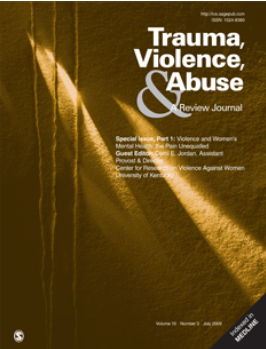校园欺凌或受害与学生睡眠问题的关系——系统回顾与元分析。
IF 5.4
1区 社会学
Q1 CRIMINOLOGY & PENOLOGY
引用次数: 0
摘要
遭受欺凌和欺凌的学生可能会出现睡眠问题,反之亦然。现有的荟萃分析只关注受害与睡眠问题之间的横断面关联或纵向联系。因此,本研究系统地回顾了文献,并对受害或欺凌与儿童和青少年睡眠问题之间的横断面和双向纵向关联进行了荟萃分析。经过对1205项研究的系统检索,摘要和全文被筛选为合格。meta分析共纳入了52项研究的216项效应。结果表明,睡眠问题与受害者(d= 0.38; 37项研究)、欺凌(d= 0.27; 12项研究)和成为欺凌受害者(d=0.48; 5项研究)的横断面关系存在中度累积效应。为了支持双向纵向模型,受害行为出现在睡眠问题之前(d = 0.43; 13项研究)和之后(d = 0.36; 5项研究)。同样,欺凌行为在睡眠问题出现之前(d = 0.34; 2项研究)和之后(d = 0.37; 3项研究)都存在。研究的方法学质量各不相同,但并没有一致地缓和这种联系。性别和年龄调节了一些关联。在女生比例较高的样本中,霸凌与睡眠问题之间的同时关联更强。受害与随后的睡眠问题之间的联系在年龄较小的学生中比在年龄较大的学生中更为明显。最后,一个小的发表偏倚迹象被记录下来。这项荟萃分析为受害或欺凌与睡眠问题之间的双向联系提供了有力的证据,并指出需要反欺凌计划来打破这种恶性循环。本文章由计算机程序翻译,如有差异,请以英文原文为准。
Associations Between School Bullying or Victimization and Students' Sleep Problems-A Systematic Review and Meta-Analysis.
Students experiencing victimization and those bullying others may develop subsequent sleep problems and vice versa. The existing meta-analyses have focused only on cross-sectional associations or longitudinal links from victimization to sleep problems. Therefore, this study systematically reviewed the literature and conducted a meta-analysis of cross-sectional and bidirectional longitudinal associations between victimization or bullying and sleep problems in children and adolescents. After a systematic search of studies, abstracts, and full texts of 1,205 studies were screened for eligibility. In total, 216 effects representing 52 studies were included in the meta-analysis. The results indicated moderate cumulative effect for cross-sectional relationships of sleep problems to victimization (d = 0.38; 37 studies), bullying (d = 0.27; 12 studies) and being a bully-victim (d=0.48; 5 studies). Supporting the bidirectional longitudinal model, victimization both preceded (d = 0.43; 13 studies) and followed (d = 0.36; 5 studies) sleep problems. Similarly, bullying both preceded (d = 0.34; 2 studies) and followed (d = 0.37; 3 studies) sleep problems. Methodological quality of studies varied, but it did not consistently moderate the links. Gender and age moderated some associations. The concurrent association between bullying and sleep problems was stronger in samples with higher proportions of female students. The link from victimization to subsequent sleep problems was stronger in younger than older students. Finally, a small indication of publication bias was documented. This meta-analysis provides robust evidence for bidirectional links between victimization or bullying and sleep problems and points to the need for antibullying programs to disrupt this vicious cycle.
求助全文
通过发布文献求助,成功后即可免费获取论文全文。
去求助
来源期刊

Trauma Violence & Abuse
Multiple-
CiteScore
13.60
自引率
7.80%
发文量
131
期刊介绍:
Trauma, Violence, & Abuse is devoted to organizing, synthesizing, and expanding knowledge on all force of trauma, abuse, and violence. This peer-reviewed journal is practitioner oriented and will publish only reviews of research, conceptual or theoretical articles, and law review articles. Trauma, Violence, & Abuse is dedicated to professionals and advanced students in clinical training who work with any form of trauma, abuse, and violence. It is intended to compile knowledge that clearly affects practice, policy, and research.
 求助内容:
求助内容: 应助结果提醒方式:
应助结果提醒方式:


